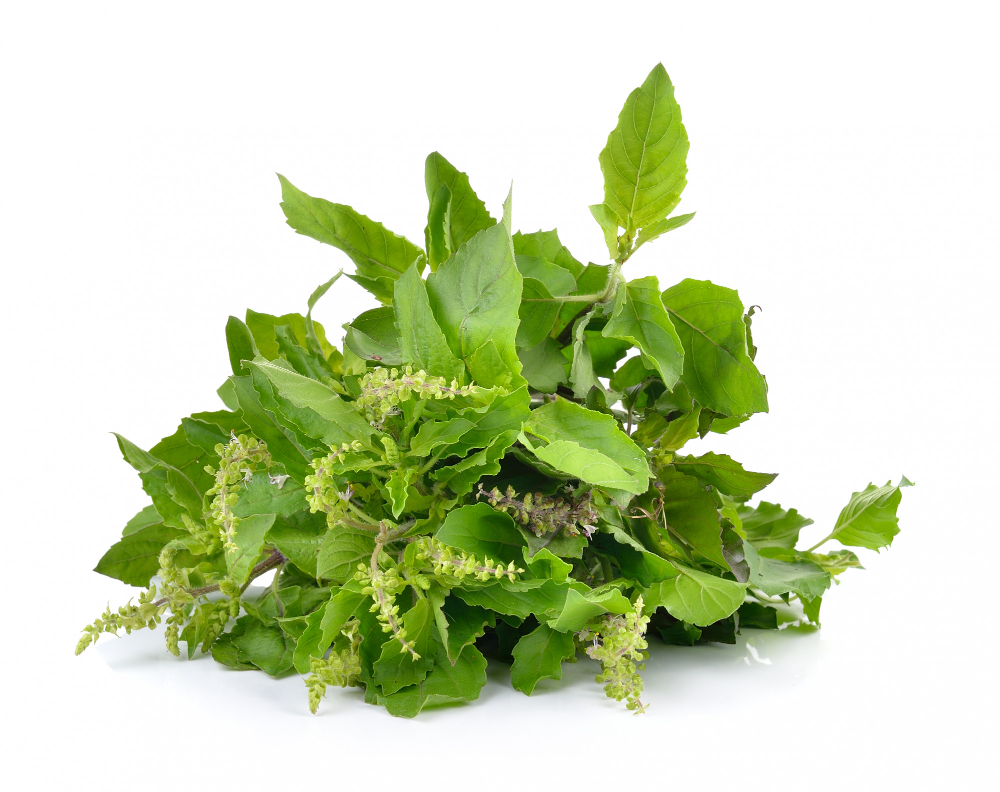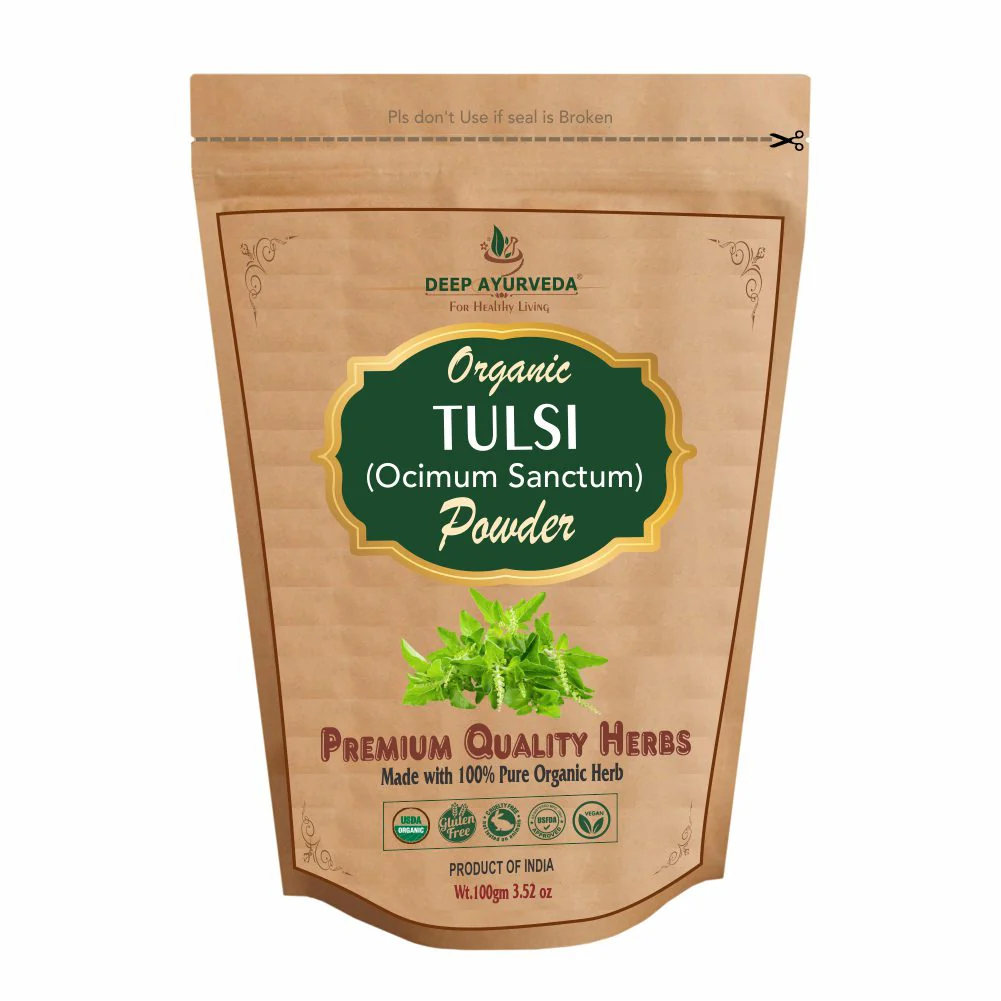Introduction
Reviews By Doctor





Tulsi

Tulsi, also known as Holy Basil (Ocimum sanctum), is one of the most revered herbs in Ayurveda and Indian culture. Often referred to as the “Queen of Herbs,” Tulsi is deeply ingrained in Hindu traditions, where it is worshipped and planted in households for its spiritual and medicinal benefits. Its adaptogenic, antimicrobial, and anti-inflammatory properties make it a valuable herb for promoting overall health. In Ayurveda, Tulsi is known for balancing the doshas and supporting immunity, respiratory health, and mental well-being.
Benefits of Tulsi
1. Stress Reliever and Adaptogen
Tulsi is a natural adaptogen, meaning it helps the body cope with stress by reducing cortisol levels. Consuming Tulsi tea or supplements regularly can help manage anxiety, enhance mental clarity, and promote emotional balance.
2. Immunity Booster
Rich in antibacterial, antiviral, and antifungal properties, Tulsi strengthens the immune system. It helps fight common infections like colds, flu, and respiratory illnesses. Tulsi is particularly effective in reducing symptoms of coughs, sore throats, and congestion.
3. Anti-Inflammatory Properties
Tulsi contains bioactive compounds such as eugenol, which have strong anti-inflammatory effects. It helps reduce inflammation in conditions like arthritis, joint pain, and other inflammatory disorders.
4. Blood Sugar Regulation
Research suggests that Tulsi may help regulate blood sugar levels by improving insulin sensitivity. It is beneficial for people with type 2 diabetes, helping maintain stable blood glucose levels.
5. Supports Heart Health
The antioxidants and essential nutrients in Tulsi contribute to cardiovascular health. It helps lower cholesterol levels, reduces oxidative stress, and prevents plaque buildup in arteries, reducing the risk of heart diseases.
6. Antioxidant and Anti-Aging Properties
Tulsi is packed with antioxidants that neutralize free radicals, preventing premature aging and enhancing skin health. It helps maintain a youthful glow and combats skin issues like acne and blemishes.
7. Detoxification and Liver Health
Tulsi supports liver and kidney function by flushing out toxins from the body. Drinking Tulsi-infused water or tea can aid digestion and improve metabolic function.
How To Use Tulsi?
1. Tulsi Tea
Steep fresh or dried Tulsi leaves in hot water for 5–10 minutes and enjoy a refreshing, immunity-boosting drink.
2. Tulsi Juice (Swarasa)
Extract fresh juice from Tulsi leaves and consume it in small quantities for its detoxifying benefits.
3. Tulsi Powder (Churna)
Dried and powdered Tulsi leaves can be consumed with warm water, honey, or mixed with other Ayurvedic herbs.
4. Tulsi Capsules or Tablets
For a concentrated dose, Tulsi is available in supplement form as capsules or tablets.
5. Tulsi Essential Oil
Used in aromatherapy, Tulsi essential oil helps relieve stress, improve focus, and promote better sleep
Recommended Dosage of Tulsi
- Tulsi Juice (Swarasa): 10-20 ml per day
- Tulsi Powder (Churna): 1-2 gm per day
- Fresh Tulsi Leaves: 5-10 leaves daily
- Tulsi Capsules/Tablets: 250-500 mg per day
- Tulsi Drops: 1-2 drops in a glass of water
Precautions
- Avoid during pregnancy and breastfeeding unless recommended by a healthcare provider.
- People with low blood sugar or those taking diabetes medications should monitor their blood sugar levels.
- If taking blood pressure or anticoagulant medications, consult a doctor before use.
- Start with a low dose to check tolerance and avoid excessive consumption.
- If allergic reactions like itching, rash, or difficulty breathing occur, discontinue use and seek medical advice.
FAQs
1. Can I consume Tulsi daily?
Yes, Tulsi can be consumed daily in moderate amounts, such as in tea or as fresh leaves, to support overall health.
2. Is Tulsi good for digestion?
Yes, Tulsi aids digestion, helps relieve bloating, and supports gut health.
3. Can Tulsi help with respiratory issues?
Yes, Tulsi is highly effective for respiratory health. It helps relieve cough, congestion, and asthma symptoms.
4. Does Tulsi have any side effects?
When consumed in moderation, Tulsi is generally safe. However, excessive intake may cause low blood sugar, acidity, or mild digestive discomfort.
5. Can I use Tulsi for skincare?
Yes, Tulsi has antibacterial properties that help with acne, skin infections, and overall skin health.
Conclusion
Tulsi (Ocimum sanctum), with its remarkable medicinal properties, is a true powerhouse of health and wellness. From boosting immunity and reducing stress to promoting heart health and detoxifying the body, this sacred herb has been an essential part of Ayurvedic healing for centuries. Whether consumed as tea, supplements, or used in aromatherapy, Tulsi remains one of nature’s most valuable gifts for holistic well-being.
References
- Ayurvedic Pharmacopoeia of India – Ministry of AYUSH, Government of India.
- Mishra, B., & Singh, R. (2011). Scientific Basis for Ayurvedic Therapies. CRC Press.
- Pandey, M. M., Rastogi, S., & Rawat, A. K. S. (2011). “Indian Traditional Medicine: A Review of Tulsi and Its Uses” – Evidence-Based Complementary and Alternative Medicine, 2011, 1-10.
- Kapoor, L. D. (2001). Handbook of Ayurvedic Medicinal Plants. CRC Press.
- Gaire, B. P., & Subedi, L. (2014). “A Review on the Pharmacological and Medicinal Properties of Ocimum sanctum” – International Journal of Pharmacognosy and Phytochemical Research, 6(3), 583-589.
- Kaur, S., Michael, H., Arora, S., Harkonen, P., & Kumar, S. (2005). “Antioxidant and Anticancer Properties of Ocimum sanctum” – Bioorganic & Medicinal Chemistry Letters, 15(1), 67-73.
- Deep Ayurveda Formulations – Official Website & Ayurvedic Practitioners’ Database.
Reviews By Doctor








